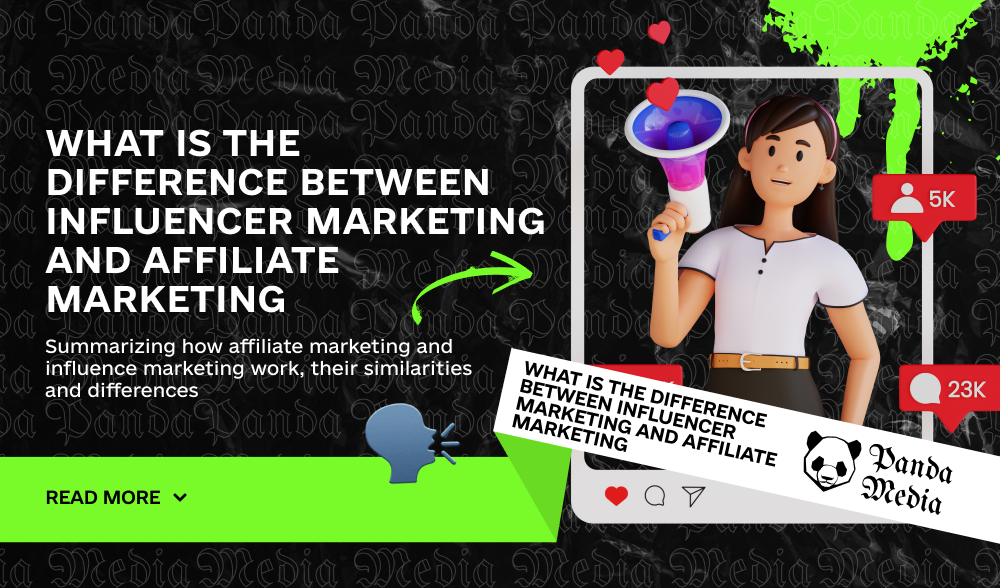Influencer marketing is the most trending solution for advertisers today. Influencer marketing provides brand awareness, and recognition and evokes associations with the most influential people in the industry. So how not to love it, right?
Affiliate marketing has been around for exactly as long as e-commerce. It has learned to adapt to people’s needs and fully utilizes modern technology to maximize effectiveness.
It’s time to deal with it once and for all! We’ll cover where affiliate marketing ends and influencer marketing begins.
How affiliate marketing works
Meet Vasya. He’s an affiliate. We call him a partner, an arbitrageur. Vasya works from home. He has a computer, but he doesn’t have his website, or blog, much less an online store. He doesn’t go to any business meetings (well, Vasya can, but for that, he needs to get a job in a marketing agency). Vasya has an ROI (return on investment) that he monitors closely.

An affiliate is a third-party advertiser who sells a product he doesn’t own by redirecting traffic to an offerer via links, banners, lendings, etc. and, if a conversion is achieved (it can be a sale, registration, form fill), receives his commission.
This all happens “behind the scenes”. The arbitrageur finds the offerer that he wants to promote, the people to whom he will offer this product, and chooses which promotion methods to use. It’s like a middleman (or middlewoman!). You are your boss – only you are responsible for your success or failure. The latter is more likely if you don’t use an ad tracker.
How Influencer Marketing Works
This is Tanya. Tanya is an Influencer. The cool thing is that she doesn’t even need a laptop, but she has one. And not a simple one, but a MacBook Pro, just because she can afford it. Tanya’s life is a pre-recorded party. She spends hours editing videos in Lightroom and brooding on Pinterest. Tanya is widely recognized in certain circles and is living every millennial’s dream life. She works with brands of all sizes, and if any products appear in her videos – it’s 99% safe to say it’s a paid advertisement.

An Influencer is a person who leads an active online lifestyle and can build brand loyalty and influence her subscribers’ buying decisions.
While for affiliates, the product itself is the screw of the program, Influencers primarily work on their image and credibility. And it’s all about using their developed social status to promote products or services to a group of people who already trust them as individuals.
Affiliate marketing vs Influencer marketing: what is the difference?
The differences exist, and they are significant. However, for some reason, people continue to confuse affiliate and influencer marketing.
To make it easier for us to understand, let’s start with the general characteristics.
What do Affiliate and Influencer marketing have in common?
The most important thing in common is that both affiliates and influencers are third-party advertisers. They are not directly affiliated with the offers they advertise.
In addition, both affiliates and influencers operate online. This means that all the benefits such as remote work, flexible schedules, the ability to be your boss, etc. – are available to both. These people are the epitome of the carefree digital nomadism that everyone longs for. And these same people choose to hide the large amount of work that goes behind the scenes.
After all, we live in a time today where if you’re good at something – you can wake up famous overnight. That’s why more and more arbitrageurs are becoming experts – coaches, trainers, teachers – and influencers.
Yes, as you can see, that already thin line has gotten even thinner.
The main differences between Affiliate marketing and Influencer marketing
Most of the differences become obvious when you become an affiliate or an influencer yourself or start working with them. And that’s because these differences are mostly related to measuring ad profitability and tracking campaign performance. Here’s what I mean by that:
An arbitrageur’s campaign is a much more specific concept than an influencer’s promo. It involves creativity, technical and analytical expertise, and even a nice bit of luck. At the same time, arbitrageurs can run several campaigns simultaneously without worrying about competitors’ products, market saturation, etc. Vasya simply invests full time in each campaign, hoping that they will become successful.
Influencer campaigns, again, revolve around the personality behind each one. The entire marketing campaign can boil down to a small, concise testimonial about the brand being advertised. Just a few words in general. But behind them lies a huge amount of upfront time and effort spent on developing an Influencer’s brand.
Conclusion
Advertising is EVERYWHERE TODAY. And it doesn’t matter whether you prefer affiliate or influencer marketing. The important thing is that it makes you money, right?
So here’s a short list of the main differences and similarities between affiliate and influencer marketing:
- Affiliate marketing for business owners is a leaner method of promotion, hence there are more offers just waiting for you.
- You need to become an authority on something before you start developing influencer marketing. And that takes time.
- With influencer marketing, your reputation is always at risk.
- There are a large number of different offers in affiliate marketing, and some of them may seem suspicious to you – you can always decline them.
- You can always start as a simple arbitrageur and then develop into an influencer.



